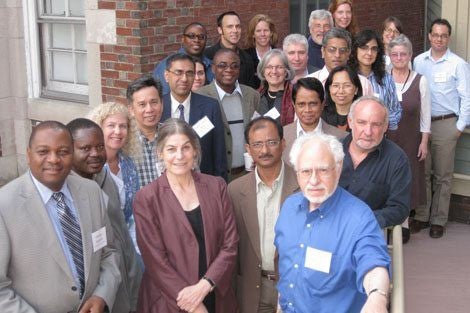October 11, 2013 — A large new study led by the Harvard Center for Population and Development Studies (the Pop Center) aims to shed light on how people in Sub-Saharan Africa are faring as they age, given that both infectious and non-infectious diseases are becoming increasingly chronic, with people surviving longer but having to cope with long-lasting ailments. The study will paint a broad picture of aging, health, productivity, and well-being among thousands of people in Sub-Saharan Africa.
“We know very little about chronic disease and aging in Sub-Saharan Africa,” said principal investigator [[Lisa Berkman]], director of the Pop Center and Thomas Cabot Professor of Public Policy and of Epidemiology at Harvard School of Public Health (HSPH). “We assume that people have infectious diseases, but in fact the world has shifted enormously. Now people are living with chronic conditions, either infectious or not, in a way we don’t understand very well. We want to characterize and understand the conditions people are dealing with, and understand what both the determinants and consequences of living with those conditions might be.”
The three-year HAALSI Program Project—Health and Aging in Africa: Longitudinal Studies of INDEPTH communities—is being funded by a $3 million grant from the National Institute on Aging. The interdisciplinary team of collaborators includes Berkman; three experts from HSPH’s Department of Global Health and Population—[[David Canning]], Richard Saltonstall Professor of Population Sciences and professor of economics and international health; [[Till Barnighausen]], associate professor of global health; and [[Joshua Salomon]], professor of global health—and colleagues including Stephen Tollman, professor from the University of the Witwatersrand, South Africa, and the INDEPTH Network, a global network of health and demographic surveillance systems based in Ghana.
A range of assessments
Researchers will begin their work in Agincourt, South Africa in 2014; in subsequent years they plan to extend the study to other INDEPTH communities, including Navrongo, Ghana, and Ifakara, Tanzania. In each community they will establish a cohort of 4,000 men and women aged 50 and over. They’ll assess participants’ health and well-being through surveys and measurements of biomarkers that indicate disease or risk of disease. They’ll look at participants’ social and economic conditions and how they function in their daily lives: how much they get around, how much contact they have with friends and relatives, and how their health conditions impact both their families and their ability to work. The researchers will also try to identify how social, economic, and labor policies influence adult health in each community.
The research team includes sociologists, clinicians, economists, and epidemiologists from the larger Harvard community, including Harvard Medical School and the Faculty of Arts and Sciences, as well as many colleagues in the INDEPTH network.
Canning, who leads a project on productivity in the HAALSI program, said, “HAALSI is a transformative study providing path-breaking new information on infectious and non-infectious diseases, physical and cognitive functioning, and work and well-being at older ages in Sub-Saharan Africa. This study will help us improve both the health and economic conditions of populations in Africa as they face the coming demographic transition with increasing numbers of Africans living successfully to older ages.”
Berkman added that the HSPH study is part of a set of large global sister studies of health and aging in low-, middle- and high-income countries around the world. The HAALSI study will be harmonized with studies in India, China, the United States, the United Kingdom, and the European Union.
“In these studies, we ask the same questions in the same way whenever possible, so that we can truly compare data,” Berkman explained, adding that data gleaned from the studies become publicly available as soon as possible to enhance researchers’ ability to analyze data across countries. “Over time, we’ll be able to understand country-level differences in health and, ultimately, be able to pinpoint the policies that promote population health.”
